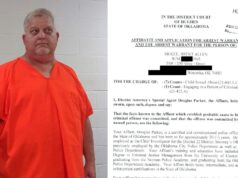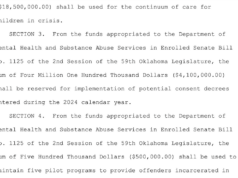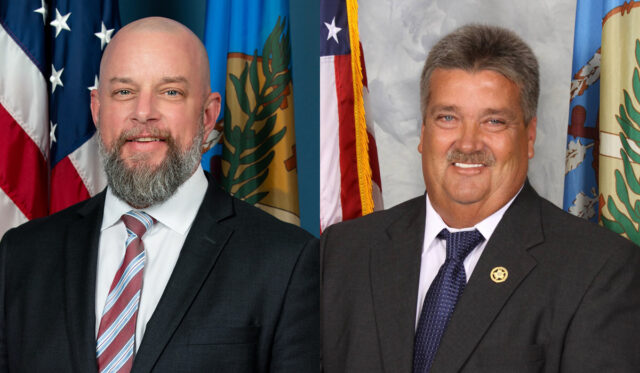
(Update: This article was updated at 4 p.m. Tuesday, Aug. 22, to include the Office of Attorney General’s deferred prosecution agreement with Shannon Smith. The article had been updated previously at 1:10 p.m. to include the State Department of Health’s administrative order and additional information about the Hughes County Jail.)
WEWOKA — When Seminole County’s Board of Commissioners and Building Trust Authority amended their operating agreement and established a lower “average daily cost” for housing inmates at the county jail Monday morning, Sheriff Shannon Smith abstained from voting, chiming in briefly to tell District Attorney Erik Johnson that a city of Holdenville agreement to move its detainees from Hughes County’s troubled facility to the Seminole County Jail has yet to be submitted.
Minutes after the meeting concluded, Smith fed a pair of resignation letters — one for himself and one for undersheriff Matthew Haley — into the office copy machine, and he submitted the formal notices to Seminole County commissioners and Johnson.
Monday’s resignations come as county leaders await a special investigative audit into financial accounts at the Seminole County Sheriff’s Office. The state’s multi-county grand jury — a powerful law enforcement body used to subpoena records and, sometimes, indict people for alleged criminal behavior — has been engaged in the inquiry.
“We’ve been told there is something going on, but no one has told us what is going on,” said Seminole County District 2 Commissioner Timothy Porter.
Smith declined to comment on the investigation Monday.
“I’m not going to discuss anything,” said Smith, who was first appointed sheriff in 2009 when his predecessor’s law enforcement certificate was suspended after he pleaded guilty to misdemeanor charges of contributing to the delinquency of a minor and driving with an open container.
More than a decade later, Smith’s own tenure drew scrutiny, some at his own suggestion. When then-District Attorney Paul Smith requested a state audit in October, Shannon Smith sought an inquiry as well.
“Please request a ‘SPECIAL AUDIT’ on the ‘Inmate trust fund’ from the state auditors office asap,” Shannon Smith wrote in a message released by the State Auditor and Inspector’s Office. “Please keep this confidential as possible for now. Depending on results, we will call the appropriate investigators and send reports to your office if anything is found to be illegal.”
Officials with the State Auditor’s and Inspector’s Office and the Office of the Attorney General confirmed an investigation is ongoing but said details could not be discussed Monday.
But on Tuesday, the AG’s office provided NonDoc with a deferred prosecution agreement finalized earlier in the day with Shannon Smith. The one-year agreement requires Smith to resign as sheriff and from the Council on Law Enforcement Education and Training. The agreement will also suspend his CLEET certification for two years and prohibit him from seeking law enforcement employment for two years. The agreement also requires him to pay restitution of $2,566 for alleged “misappropriation” of funds.
Signed by senior deputy attorney general Jimmy Harmon, Smith and Smith’s attorney, Irvin Box, the deferred prosecution agreement reveals some details of the allegations against the longtime Seminole County sheriff.
“The state of Oklahoma hereby agrees not to file charges against Shannon Smith for crimes arising from his misappropriation of funds from the Seminole County Sheriff Deputy Association Fund if Shannon Smith satisfactorily completes the conditions of this agreement,” the agreement states. “He understands and acknowledges that this agreement pertains only to the misappropriation of funds from the Seminole County Sheriff Deputy Association Fund and does not apply to any other past, pending, or future investigation or prosecution against him or any other person.”
Other former employees of the Seminole County Sheriff’s Office, including Haley, remain under investigation for financial issues, sources have told NonDoc on the condition of anonymity.
Johnson, who replaced Paul Smith in January as the District 22 DA covering Seminole, Hughes and Pontotoc counties, said Monday that he recused from the investigation in March.
“They were seeking a subpoena for some personal financial records is the best of my information,” Johnson said. “I don’t know if there is a deferred prosecution agreement that has been executed by the sheriff or not on some of the goings-on. I don’t know the answer to that.”
According to their letters, Haley’s resignation was effectively immediately, while Smith would depart Aug. 31.
Follow @NonDocMedia on:
‘A double-barreled shotgun of tremendous liability’
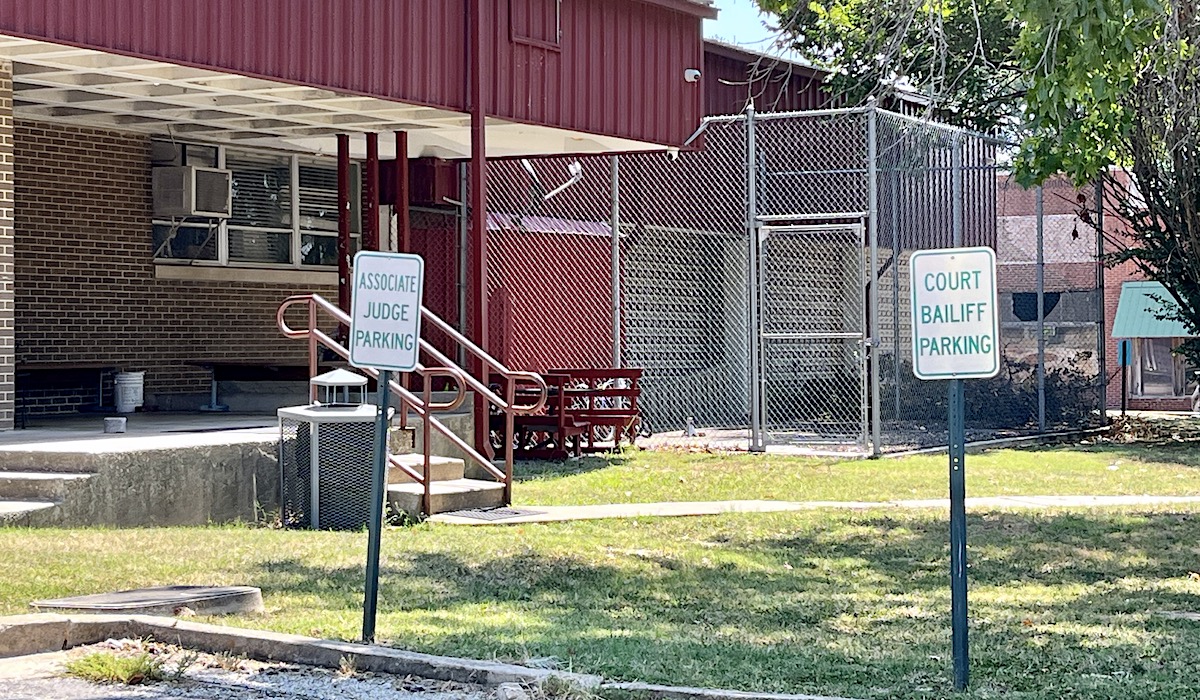
Monday’s drama in Seminole County comes as leaders of neighboring Hughes County continue their years-long discussion about how to address serious health and safety violations at the subterranean Hughes County Jail.
Wewoka and Holdenville, the two counties’ respective seats, are about nine miles and 13 minutes apart, which makes the Seminole County Jail an accessible alternative to the Hughes County Courthouse’s basement.
“We’ve been in talks with them to house their inmates,” said Porter, a Seminole County commissioner. “At that time, $67 a day was our average cost, and theirs was like $40 or something. Nobody could come up with an agreement.”
Since taking office more than seven months ago, Johnson has engaged in near shuttle diplomacy among the elected stakeholders tasked with incarceration decisions for cities, counties and tribal nations.
“My intention is to negotiate an agreement with Hughes County to house Hughes County Jail inmates [in Seminole County] for approximately 18 months while we close the Hughes County Jail and figure out what our bond [options] are,” Johnson told the Seminole County Board of Commissioners on Monday morning. “Right now, I’m under an administrative complaint order from the State Department of Health.”
Dated May 31, the Oklahoma State Department of Health’s administrative complaint order (embedded below) identified 50 violations and said the Hughes County Jail is “substantially non-complaint with the applicable standards” outlined in Title 310, Chapter 670 of the Oklahoma Administrative Code for county and municipal detention facilities.
In a letter to Johnson referring the matter to his office for action, OSDH referenced “repeat deficiencies” at the jail and threatened “administrative penalties” if issues were not addressed.
Johnson and Hughes County Sheriff Marcia Maxwell each said Maxwell’s office has updated policies and procedures in accordance with OSDH’s report, although they agreed Johnson had not received an updated copy. Maxwell said OSDH has received the Hughes County Jail’s updated policies, and she also referenced a recent analysis from the Office of the Attorney General that determined the Legislature had repealed a statute that had previously provided authority for OSDH to create a rule regarding the minimum square footage requirements for housing an inmate.
“In short, by removing reference in the guidelines in (Title 74, Section 192) Subsection A to square foot requirements, the State Department of Health does not have the necessary statutory underpinning or authority to enforce its existing rules or promulgate new rules concerning square footage requirements,” Carolyn Thompson, the attorney general’s legislative liaison, wrote in correspondence ultimately provided to district attorneys. “Without a legislative delegated authority, an administrative agency cannot promulgate a rule.”
Still, Johnson said the underground jail’s broader health and safety issues continue to pose problems, both from a humanitarian perspective and as an attorney concerned about legal liability.
“I made a calculation error, in that I thought this wouldn’t be as grueling as it has been,” Johnson said after Monday’s meeting. “But it has been grueling. I’ve been working on it for seven months. I’m asking them to look down the road and say, ‘Look, you’ve got an untenable situation here.’ The can has been kicked continuously down the road. I’m not going to be that guy that’s going to allow it go any further down the road.”
In January 2020, Hughes County voters roundly rejected a proposed property tax increase to fund a new jail, with 78.7 percent of ballots cast against the proposal. While Johnson said he is working to strike a new agreement with Hughes County leaders and officials with the Muscogee (Creek) Nation and Choctaw Nation for a new $8 million jail and public safety center, his first priority is to find a way to move detainees out of the current Hughes County Jail.
“We’ve got good county commissioners in Hughes County that want to solve this problem,” Johnson said. “The problem is we don’t have the financial ability as we sit currently to solve the problem. And in the interim, we are staring down a double-barreled shotgun of tremendous liability. And this isn’t just my office saying this, it’s our insurance counsel telling us, the State Health Department telling us, that we have to do something about our jail operations.”
One of those Hughes County commissioners is Jim Lively, who said Monday that he and his fellow commissioners asked Johnson to bring them firm fiscal estimates on the price tag for an entirely new jail and on the cost of housing inmates in Seminole County.
“Until they come up with a number, we can’t make a decision on whether it’s going to be short-term or long-term,” Lively said. “We may not have the money to do it either way.”
The Hughes County Board of Commissioners is scheduled to meet at 9 a.m. Tuesday. Although the day’s agenda includes no items related to the county’s troubled jail, it’s possible that someone from Johnson’s office will relay Monday’s discussion with Seminole County leaders.
During Monday morning’s Seminole County meeting, commissioners approved an amended agreement specifying that the Seminole County Jail is governed and operated by the Seminole County Building Trust Authority, to which the board of county commissioners is the beneficiary.
They also approved a new process for analyzing the jail’s “average daily cost” by tracking data on a standard spreadsheet provided by the Oklahoma Sheriffs Association. Last fiscal year, the Seminole County Jail had charged other jurisdictions $67.54 per day per inmate housed. The new rate approved Monday is $57.51.
In addition, Johnson suggested to commissioners that they could adopt a policy providing a 10 percent or 15 percent per day per inmate discount for entities — such as the city of Holdenville, Hughes County or the Seminole Nation — that fill at least 30 beds per day per month. Commissioners, however, tabled that item for discussion at a later meeting.
Seminole County recently lost significant jail revenue after the Seminole Nation chose not to renew its contract for jail services.
“The Seminole Nation of Oklahoma had a detention agreement with Seminole County to house inmates, this agreement was renewed annually for many years. However, due to the drastic increase of cost per inmate and the increase of tribal cases due to the Supreme Court’s McGirt ruling, the Seminole Nation entertained other options,” said Seminole Nation Assistant Chief Brian Thomas Palmer. “These options led to two other agreements that are less of a financial burden on the Seminole Nation which allowed the agreement with Seminole County to simply expire in December of 2022. Officials have not reached out to negotiate terms for a new agreement at this time.”
In a previously unpublished interview with NonDoc in 2022, Smith said jail contract negotiations with the Seminole Nation involved “four or five months of yelling and screaming and hollering at each other.”
Smith said the now-expired contract required the Seminole Nation to pay for the equivalent of 15 beds at the county jail every day, no matter how many Seminole tribal citizens were detained at any given time.
“This was not an easy go,” Smith said of contract negotiations in 2022.
But Maxwell, the Hughes County sheriff, also said prior cost estimates to contract with the Seminole County Jail have been a barrier.
“We can’t afford $70 a day in Seminole County,” she said. “That’s my only thoughts.”
Maxwell agreed with Johnson and Lively that building a new jail would be beneficial to Hughes County.
“Yes, if it’s something that the county can afford,” she said.
Lively said he agrees that the Hughes County Jail “needs work.”
“I would love to have a new jail, but if the voters turn it down, we can’t do it. We’ve got to do something,” Lively said. “When they built that jail, they should have never put it underground anyway.”
The Seminole County Board of Commissioners is set to hold a special meeting 2 p.m. Thursday to accept the resignations of Smith and Haley and to consider appointing an interim sheriff.
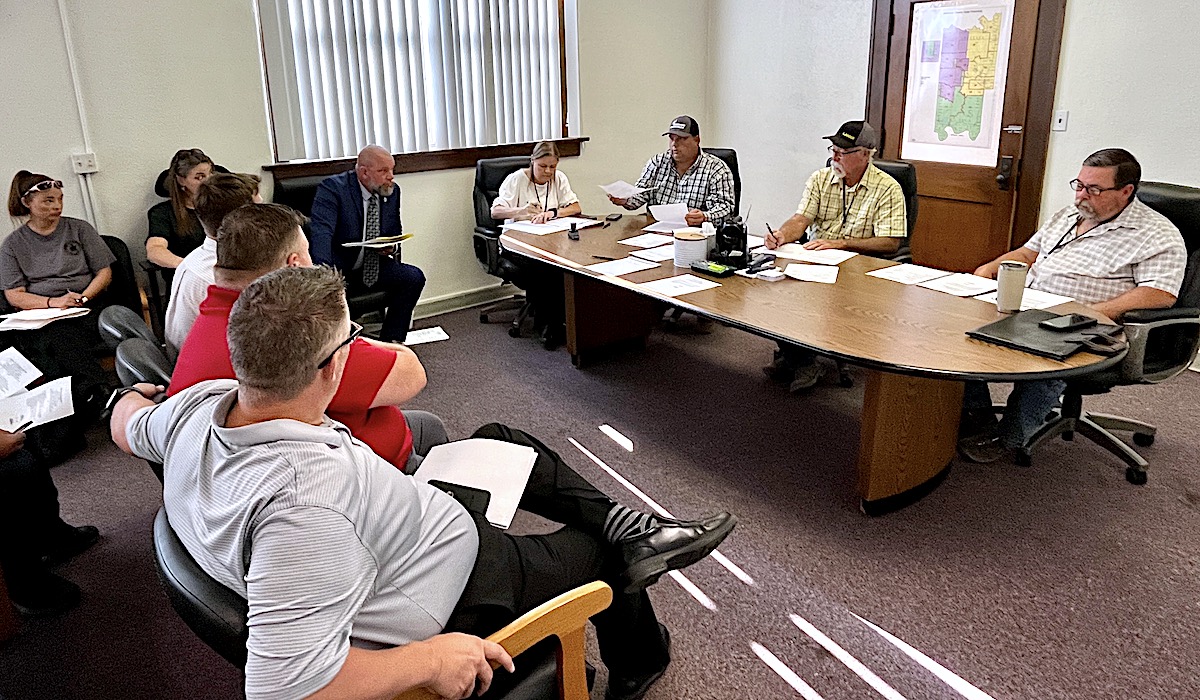
Meanwhile, 400 miles away in the panhandle
As the Seminole County Board of Commissioners considers its options in appointing a replacement for Shannon Smith, another county almost 400 miles northwest has announced its new sheriff.
In Cimarron County in the Oklahoma panhandle, officials swore James Taylor in as the new sheriff Monday evening, at least temporarily resolving a situation where low compensation for the position limited the county’s ability to fill the job following the resignation of Mike Berguetski.
Boise City is the seat of Cimarron County, the farthest northwest corner of Oklahoma.












